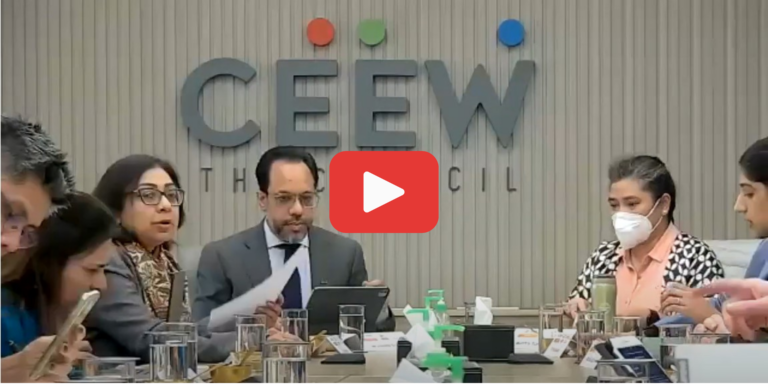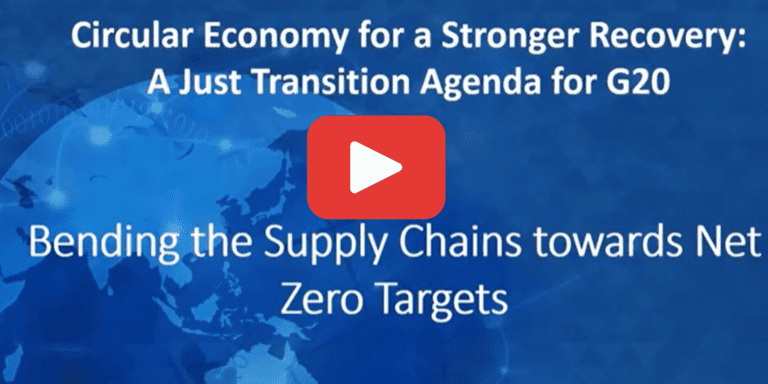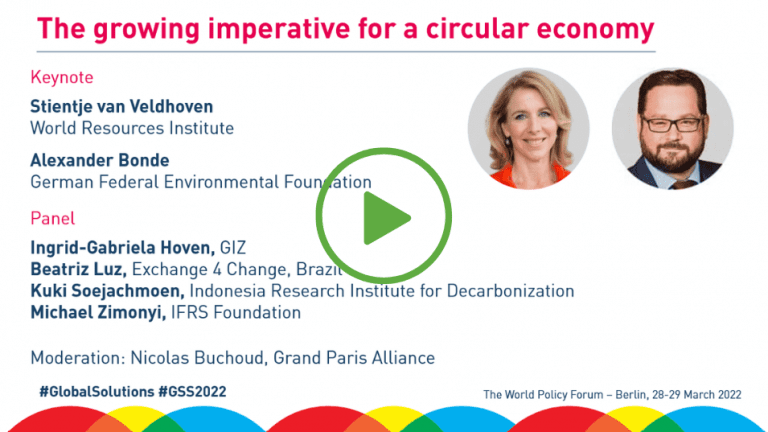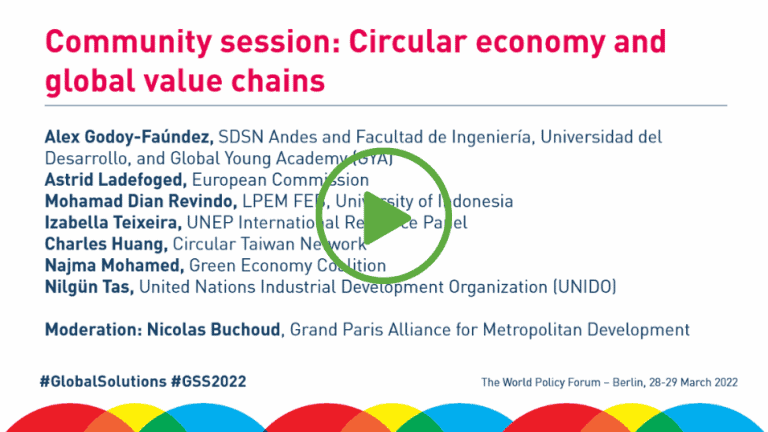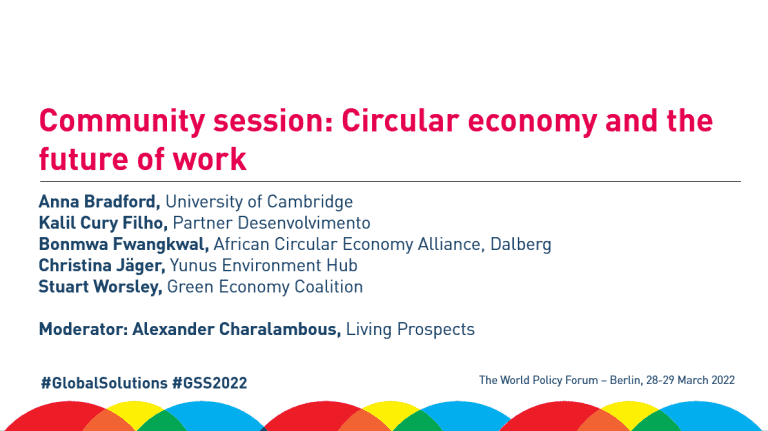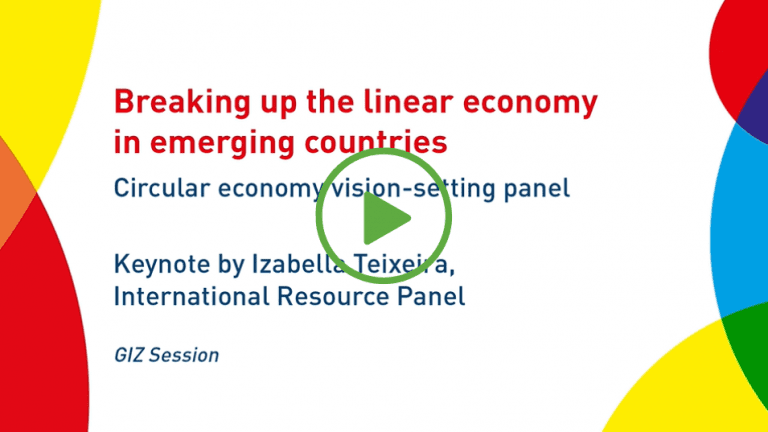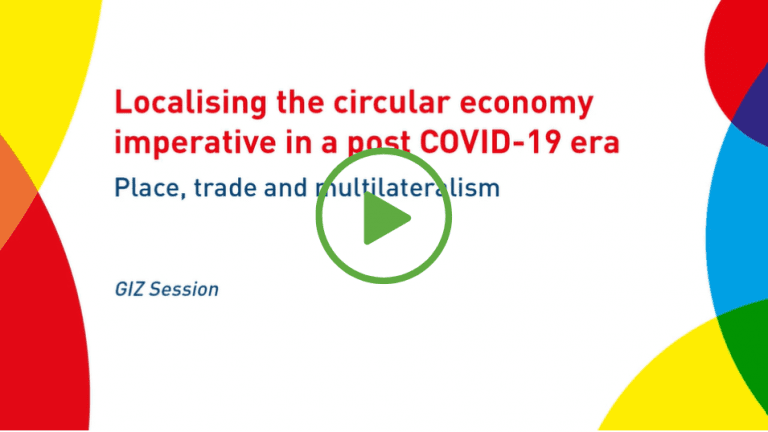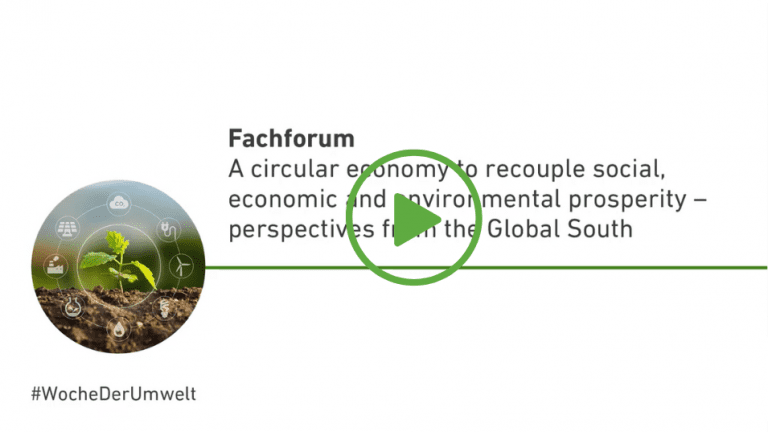.
Circular Economy Solutions Dialogues
The Circular Economy Solutions Dialogues (CESD) advance the circular economy agenda and facilitate the initiative to disseminate green technologies globally and their contextualized application. The CESD are implemented by the Deutsche Gesellschaft für Internationale Zusammenarbeit (GIZ), within the Global Project Support of the Export Initiative for Green Technologies, on behalf of the German Federal Ministry for the Environment, Nature Conservation, Nuclear Safety and Consumer Protection (BMUV), in cooperation with the Global Solutions Initiative.
Call for Action
Reversing the Linear Path – Circular Economy in the Roadmap for Global Recovery
The members of the Circular Economy Solutions Dialogues (CESD) Sounding Board, call for decisive action to accelerate the transition to a circular economy. The Call for Action is supported by Sounding Board members representing low-, middle- and high-income countries as well as international, local, public and private organizations. Read the full Call for Action here.
- were launched with a view to inspire a conducive circular economy (CE) narrative feeding into the G/T20 process
- build on the momentum of multilateral policy dialogues and commitments on the circular economy (GACERE, ACEA, LAC CE Coalition, G20 Resource Efficiency Dialogue)
- focus on both analyzing mechanisms scaling-up circularity and devising context-sensitive strategies for their broad implementation
- take place in a co-creative digital set up, each involving 20-30 participants with various institutional and sectoral backgrounds
- are complemented by a Sounding Board, a parallel, amplifying dialogue stream dedicated to developing a cross-sector circular economy agenda at a multilateral level, targeting international fora, such as the G20, T20, ASEAN and the EU
- span across three thematic cycles, focusing on
1. plastics
2. global value chains
3. urban metabolism and sustainable infrastructure
The first CESD series deliberated, among others, about the multitude of technological, business and other circular economy approaches for plastics proposed by the private sector. It explored proposals for more conducive policy and financial framework conditions to turn individual initiatives into wide-scale global solutions.
The sessions focused on the circular economy in the plastics value chain and analyzed enabling options and tools (e.g. implementing EPR systems, empowering consumers and public buyers, enhancing waste prevention initiatives, and incentivizing the promotion of green technologies) to establish regulated residual and resource streams.
Full review available here.
The second CESD series analyzed mechanisms embedding circularity in Global Value Chains (GVC), notably the business, policy, knowledge and finance ecosystem of GVCs, inspiring a conducive Circular Economy (CE) narrative feeding into the G/T20 process. It built on the engagement and leading role of GVCs in global trading and in the recent global economic and trade disruptions caused by the COVID-19 pandemic, as well as on multilateral policy dialogues and commitments on the circular economy.
In addition to this, it focused on analyzing challenges with regard to the integration of circularity into value chains, on identifying scalable tools and approaches as well as on analyzing mechanisms scaling-up circularity and devising context-sensitive strategies for their broad implementation. .
In the third installment of the CESD, we aim to inspire a dialogue to complement the G/T20 process under the Indonesian presidency. This includes, analyzing mechanisms scaling-up circularity and devising urban and peri-urban strategies for implementation. We will also build on the momentum of multilateral, inter-city policy dialogues and commitments towards a circular economy.
Key dates:
- Session 1: 9 March 2022
- Session 2: 6 April 2022
- Session 3: 4 May 2022
- Session 4: 18 May 2022
- Deep Dive Webinar: 8 June 2022
The members of the Sounding Board reviewed the significance of the circular economy agenda during Indonesia’s G/T20 presidency and found strong support for it. Several representatives led the conversation by highlighting key takeaways from various discussions held by the G/T20 Indonesia. The board also discussed its future activities and called on members to continually engage one another in meaningful activities and events.
Members expressed hope that Europe could become a forerunner of circular economy by setting global standards for trade integration, technology and knowledge transfer. While this means (more) local upstream regulations to establish global cooperation, members cautioned against an inflation of concepts..
Among the core messages, members highlighted that a whole-of-government approach to circular economics is critical. They also called for circular citizenship, where education plays an important role in influencing consumption preferences.
Members also deliberated on the matter of ownership. They debated if transferring ownership from consumers to manufacturers would lengthen the end-of-life of the product. They also pushed for developments in new business models for leasing and sharing. Here, it was noted that new developments should include measures to protect consumers against disruption or termination of such services.
Members noted that current accounting principles are linear: real costs are not embedded in valuation practices. To eliminate this, they stressed the need for corporations to internalize their social and environmental costs. Guidelines for corporations should be also created to push for wage increase and improvement to quality of life, financed by savings from implementing circular practices.
Members reiterated the importance of taking into account local differences when creating and implementing circular solutions. They also called for more practical tools to aid effective implementation of theoretically-orientated circular frameworks.
The meeting also reported on the past and future activities of the CESD series. It heard feedback and comments from members.
Members found that the increasing drive of companies for cost efficiency has led to highly branched global supply chains, as we observe today. They agreed that it was optimal to join forces and build momentum towards the inclusion of circular economy and resource efficiency as a solution into COP.
The need for global and local Circular Economy Action Plans resonated with the members of the Sounding Board. Effective coordination between and among countries and regions, in particular via cross-border cooperation, was noted. Designs to facilitate flows of goods and services within cross-border circular economy chains should include cities and avoid piecemeal transformations. The members stressed the need to define circular economy pathways for developing countries and pathways for developed countries, subject to the nature of urbanization pathways.
Members of the CESD Sounding Board convened to discuss the implications of the current global health crisis in achieving circularity in global value chains. The members agreed that in the face of mounting pressure to adapt and increase financial profitability, businesses are finding it difficult to maintain their commitments to circular economy and sustainability goals.
The discussion rounded up with a call for action on two main areas. First, the members called on international and multilateral actors to join forces, convene and build momentum towards incorporating circularity in energy transition plans and climate change mitigation strategies. A refined analyses of the COP26 results and the G20/G7 recovery policies were identified as complementary processes. Second, there was resounding support for cross-border cooperation in the development of circular economy response plans. The Sounding Board members recognized that, while standardized response plans are not internationally operable, coordination and alignment are necessary to effectively embed circularity at the global and local levels of the supply chain.
Circular economy sessions at the Global Solutions Summit 2022
Sessions at the Global Solutions Summit 2021
Circular economy session at the DBU’s Woche der Umwelt
Upcoming event(s)
Past event(s)
- CESD’s contribution to T20 Indonesia Task Force 3 – Governing climate targets, energy transition, and environmental protection:
Agustina et al (2022). “Embedding the Circular Economy in Global Value Chains: Strategies and Frameworks for a Just and Effective Transition” Policy Brief. Think20 Indonesia. - Read the latest on what resource efficiency means as we move “Towards a circular economy transition” in the Global Solutions Journal Issue 8 – Summit 2022 Edition.
- The policy brief “Localising the circular economy imperative in a post COVID-19 era: place, trade and multilateralism”, co-authored by participants of the CESD, is a contribution to the Task Force 2 – Climate Change, Sustainable Energy & Environment under T20 Italy.
- “A key catalyst for the transition to a circular economy – the case of Jordan” describes the case of Extended Producers’ Responsibility in the Global Solutions Journal – Summit 2021 Edition
- Catch up on the discussions from the deep dive webinar on “Construction and demolition waste, and the role of digitalization” with this comprehensive visual report.
- Insights from the GIZ/GSI Cooperation. Knowledge Hub for Green Technologies.
If you are interested to learn more or if you are working on research papers or policy briefs related to circular economy that you would like to share, contact [email protected]

